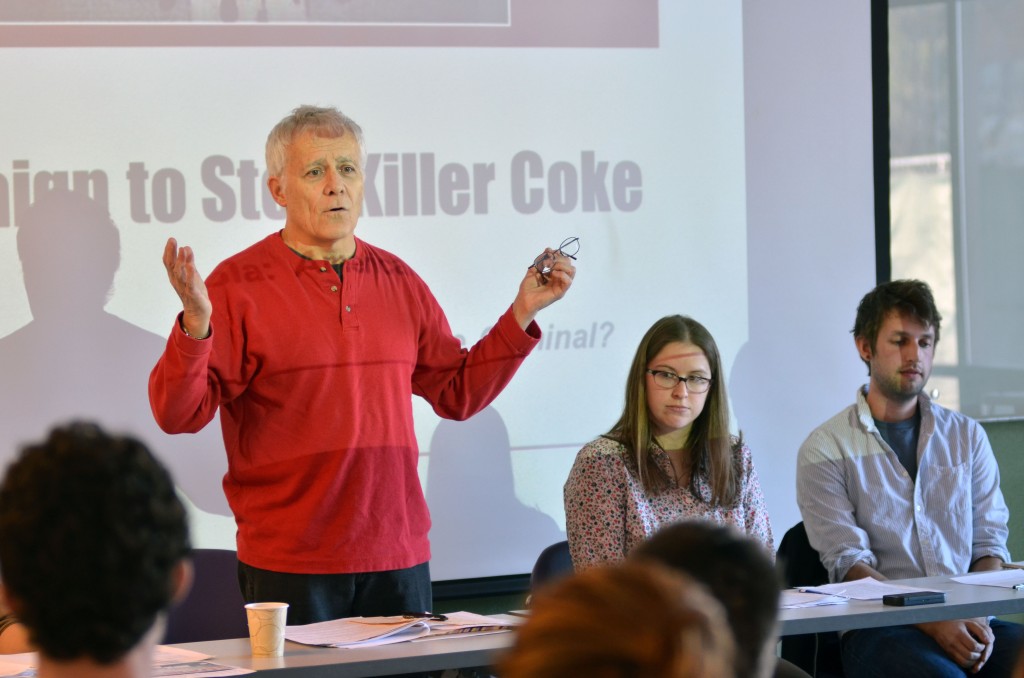
In an attempt to get students to think twice about their soft drinks, activists spoke Thursday night about allegations of human rights abuses by the Coca-Cola and Reynolds companies.
Students Organizing Against Reynolds (SOAR) and Ray Rogers, the founder of Corporate Campaign, Inc., spoke about their mission to remove Coca-Cola Co. and Reynolds Group products from the campus.
Rogers said that the Coca-Cola Company conducts business immorally, illegally and with prejudice. According to Rogers, Coke was complicit in the kidnapping, torture and murder of union leaders and their families. He also said that Coke knowingly markets products to young children that are known to contribute to diabetes, high blood pressure and obesity.
Maggie Walsh, an undeclared freshman, said she no longer wanted Coca-Cola products to be sold on campus after hearing Rogers speak.
“I drink a lot of Coke so I think I’m turned off now,” Walsh said. “I don’t think we should be putting a company that’s clearly violating so many laws and supporting so many injustices into our campus and supporting that system.”
Rogers said he became aware of the alleged assaults occurring first in Guatemala, and later in Colombia. According to Rogers, in 2010, a human rights abuse lawsuit was filed against Coca-Cola in a U.S. District Court, accusing the management of Coca-Cola bottling and processing plants in Guatemala of requesting and/or condoning the rape, murder and attempted murder of union leaders and their families. Rogers is working to expose the same crimes that he said are occurring today in Colombia.
Jessica Dunn, a freshman majoring in sociology, said she had never heard of these crimes associated with Coke before.
“It was so eye-opening,” Dunn said. “I didn’t know any of this stuff about Coke. I am so concerned, and I am definitely motivated to take some action.”
Coca-Cola wasn’t the only company that came under scrutiny at Thursday evening’s talk. SOAR members made their own claims at the event against the Reynolds Group, especially its subsidiary, Pactiv.
Kai Wen Yang, the founder of SOAR at BU, spoke about a Pactiv plastic container factory in Kearny, N.J., which he said had about 100 workers in June 2010 working under poorly ventilated conditions with temperatures reaching above 100 degrees that caused one woman to faint. Yang said that while workers organized to join the United Steelworkers union, Pactiv busted the unions by threatening to close the factory and bribing workers with wage, hour and condition improvements that never happened. According to Yang, Pactiv laid off 60 percent of its work force, resulting in mandatory overtime and decreased pay for the remaining workers.
Yang said SOAR aims to end the practice of mandatory overtime to give workers more freedom.
“Here is the issue of mandatory overtime,” Yang said. “Right now, SOAR is demanding that mandatory overtime be ended, and workers … should be able to control their working hours.”
Both SOAR and the “Killer Coke” campaign have taken action against these companies in the past. SOAR held a protest outside of the Walmart on Vestal Parkway in fall 2012 to protest the selling of products made by the Reynolds Group. Factory workers at the Kearny, N.J. Pactiv plant made appearances and protested alongside the organization. The “Killer Coke” campaign has worked to oust Coke from 70 college campuses, including Stony Brook University, the City University of New York and Rutgers University.
Dunn said removing the companies from the Binghamton University campus is key.
“I think the first step is to get them off campus,” Dunn said. “Then, we should participate in the movement as a whole to get them to stop these practices altogether.”
The presentation was sponsored by the Latin American and Caribbean area studies program, the sociology department, Students for Social Justice (Experimental Media Organization) and the Women’s Student Union.


